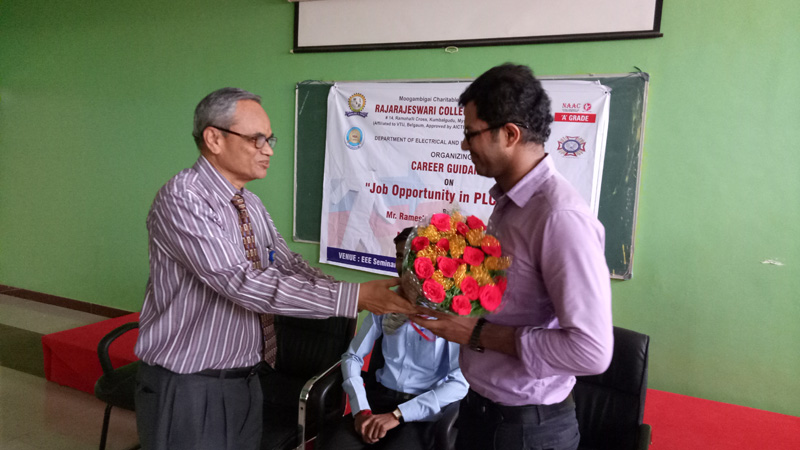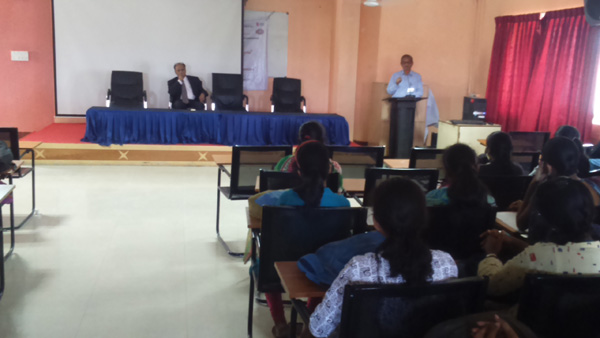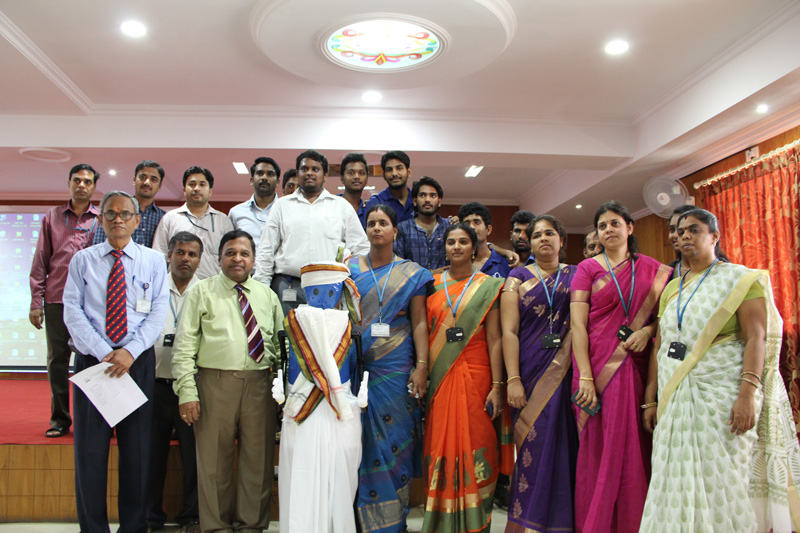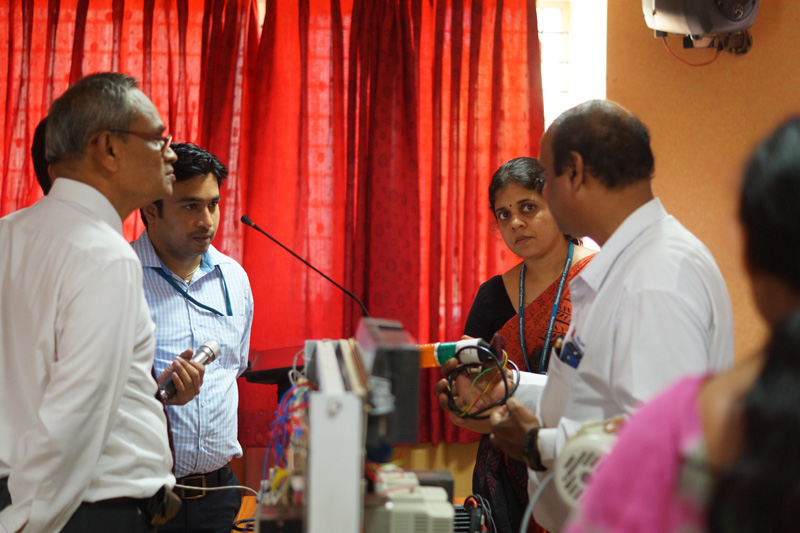Overview
The department was established in the year of 2006 with an intake of 60. The department has well equipped laboratories to fulfill the needs of syllabus. The students of this department have consistently performed well in the university examinations.
Read More
The Students are encouraged to update their knowledge by regularly attending workshops, seminars, conference etc. The department is conducting various events like workshops, technical seminars, expert lectures FDPs etc. to meet the needs of today’s competitive world.
The course career paths followed are diverse ranging from electronic product design to heavy electrical plant maintenance, from research to production, from technical focus to customer focus.
Mission
To impart high-quality education in Electrical and Electronics Engineering through a dynamic curriculum, experiential learning, and cutting-edge laboratory facilities,fostering academic excellence and professional competence.
To promote research, innovation, and industry collaboration by encouraging students and faculty to engage in interdisciplinary projects, pursue patents, and address real world engineering challenges.
To instill ethical values, environmental consciousness, and lifelong learning in students, preparing them to be responsible engineers, entrepreneurs, and leaders who contribute meaningfully to society and sustainable development.
Vision
To be a center of excellence in Electrical and Electronics Engineering education and research, fostering innovation, entrepreneurship, and sustainable technologies to serve societal and industrial needs in a rapidly evolving global landscape.
Course Name
Electrical and Electronics Engineering
Duration
4 + years
Eligibility
Marks - General
45% Aggregate
Marks - SC / ST / OBC
40% Aggregate
Eligibility - Subjects
- Physics & Mathematics along with Chemistry/ Bio technology/ Biology
Eligibility - Exam
- A rank is must in Entrance Examinations like CET, KRLM, COMED –K, AIET, AIEEE Etc,.
Eligibility (Working Professionals)
Eligibility for Working Professional B.E Programs
* Candidates must have a diploma (any Discipline) with a minimum of 50% marks
* Experience Certificate and Salary Certificate are mandatory
* The admission will be processed through the DCET qualifying examination (DCET CODE -E145)
* The work location/ Residence must be within a 50 - 75 km radius of the institution.
Application Form
Application Not Available! Please contact the office!
A+ Accreditation, Approvals, and Recognition
- Approved by AICTE
- Affiliated to VTU
- Approved Research Center
- NBA Accredited(2nd cycle till 2022)
- NAAC A+ Grade Accredited
Career Opportunities
Electrical and Electronics Engineering opens career opportunities in many different areas, e.g.: electronics, design, commissioning and maintenance; project engineering and planning; automatic control and instrumentation, robotics; technical liaison and support; marketing and management.
Activities
Our Strength
Infrastructure
- Control systems Lab
- Power Electronics Lab
- Electrical Machine Lab
- Electronics Lab
- Microcontroller Lab
- Power system simulation lab & Digital Signal Processing Lab
- CAED LAB
- Relay & High Voltage Lab
- Circuit Laboratory using PSpice
Objectives
Program Educational Objectives
- The graduate will succeed in industries/technical profession and/or pursue post graduate program in Electrical & Electronics Engineering and allied fields by providing solid foundation in fundamentals of Mathematics, Science and Electrical & Electronics Engineering using modern tools and equipment to correlate theoretical aspects with practical needs.
- Graduates will be thorough professionals equipped with sound leadership, interdisciplinary teamwork, communication skills, and ethical practices along with concerns for environment and societal well being.
- Graduates will possess the capability to acquire new knowledge through skills of analysis, synthesis and knowledge generation, transmission and distribution in designing electrical systems to solve engineering problems and remain life-long learners in an increasingly technology-dependent society.
Program Outcomes
- PO1: Engineering Knowledge: Apply knowledge of mathematics, natural science, computing, engineering fundamentals and an engineering specialization as specified in WK1 to WK4 respectively to develop to the solution of complex engineering problems.
- PO2: Problem Analysis: Identify, formulate, review research literature and analyze complex engineering problems reaching substantiated conclusions with consideration for sustainable development. (WK1 to WK4)
- PO3: Design/Development of Solutions: Design creative solutions for complex engineering problems and design/develop systems/components/processes to meet identified needs with consideration for the public health and safety, whole-life cost, net zero carbon, culture, society and environment as required. (WK5)
- PO4: Conduct Investigations of Complex Problems: Conduct investigations of complex engineering problems using research-based knowledge including design of experiments, modeling, analysis & interpretation of data to provide valid conclusions. (WK8).
- PO5: Engineering Tool Usage : Create, select and apply appropriate techniques, resources and modern engineering & IT tools, including prediction and modeling recognizing their limitations to solve complex engineering problems. (WK2 and WK6)
- PO6: The Engineer and The World: Analyze and evaluate societal and environmental aspects while solving complex engineering problems for its impact on sustainability with reference to economy, health, safety, legal framework, culture and environment. (WK1, WK5, WK7).
- PO7: Ethics : Apply ethical principles and commit to professional ethics, human values, diversity and inclusion; adhere to national & international laws. (WK9)
- PO8: Individual and Collaborative Team work: Function effectively as an individual, and as a member or leader in diverse/multi-disciplinary teams.
- PO9: Communication: Communicate effectively and inclusively within the community and society at large, such as being able to comprehend and write effective reports and design documentation, make effective presentations considering cultural, language, and learning differences
- P1O: Project Management and Finance: Apply knowledge and understanding of engineering management principles and economic decision-making and apply these to one’s own work, as a member and leader in a team, and to manage projects and in multidisciplinary environments.
- P11: Life-Long Learning : Recognize the need for, and have the preparation and ability for i) independent and life-long learning ii) adaptability to new and emerging technologies and iii) critical thinking in the broadest context of technological change. (WK8)
Program Specific Outcomes
- PSO I: Solve EEE problems like a pro - Understand the latest technologies and models in the field of advanced engineering
- PSO II: Speak like an Executive – Develop technical skills in presenting modern insights
- PSO III: Work like an innovator – Complete the program with realistic ideas and employability skills
- Electrical Measurments & Instruments.
- Analog Electronic Circuits
- Transformers & Induction Machines
- D.C. Machines & Synchronous Machines
- Illumination Engineering
- Linear Control Systems
- Reactive Power Management
- High Voltage Engineering
- HVDC Power Transmission
- Computer Communication and Networking
News & Events
- 6
- Feb
- 2026
Guest Lecture on “Modern Methodology for Product Development”
The Department of Electrical and Electronics Engineering, RRCE successfully organized a guest lecture on “Modern Methodology for Product Development.”
- 5
- Dec
- 2025
“Innovex 2025” – College Level Project Exhibition
The Department of Electronics & Communication Engineering, in collaboration with AI&ML, CSE, CSE–IC, CSD, EEE, ISE, Robotics & Automation, and MCA,
- 5
- Dec
- 2025
Electric Vehicle Show & Idea Presentation – “An Innovative Idea Towards EV”
EVISION – The Electric Club of RRCE organized an event titled “Electric Vehicle Show & Idea Presentation – An Innovative Idea Towards EV” on 5th December 2025, starting from 1:00 PM, at the Department of EEE, RRCE.
- 4
- Dec
- 2025
Mr. Pavan from EEE Department, Secures Placement with M/s. Storeys
Mr. Pavan, Batch 2025, Department of Electrical & Electronics Engineering (EEE), has secured a prestigious placement offer with a CTC of 33 LPA at M/s. Storeys.
- 3
- Dec
- 2025
“Plantita – The Green Tots 2K25”
Plantita – The Green Tots 2K25 focused on the adaptation of plants and organic farming.The event was held on 3rd December 2025 at 12:15 PM in the EEE Department.
Syllabus
KSCST – Funded Student Projects
Publication & Conference Contribution Summary
| Year | IJ | IC | NC | TOTAL |
|---|---|---|---|---|
| 2024-2025 | 15 | 04 | 00 | 19 |
| 2023-2024 | 19 | 08 | 00 | 27 |
| 2022-2023 | 19 | 00 | 02 | 01 |
| 2021-2022 | 16 | 16 | 02 | 34 |
| 2020-2021 | 02 | 02 | 00 | 02 |
| 2019-2020 | 13 | 02 | 00 | 15 |
| 2018-2019 | 00 | 00 | 03 | 03 |
| 2017-2018 | 06 | 01 | 07 | 14 |
| 2016-2017 | 01 | 00 | 03 | 04 |
| 2015–2016 | 08 | 02 | 03 | 13 | 2014–2015 | 01 | 02 | 10 | 13 |
Value Added Program
Project Internship Certificate
- Internship Details along with Certificates
- Mini Project List along with Certificates
- Project List (main) and Certificates 2024-25
- Project list
- Internship details 2023-24
- Project Report Proof
- Internship Certificates
- 2021-22
2022-23 - Project Certificates 2022-23
- 8th Semester Internship Certificates 2022-23
View 5 Years Faculty Publications
View Student Publication 2019-20
















